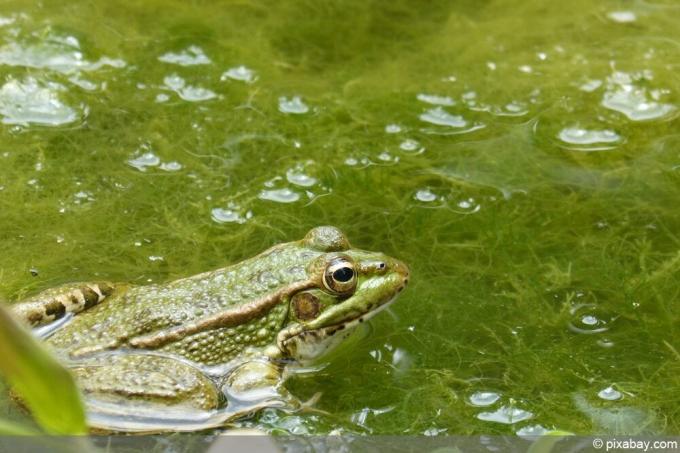

Table of contents
- causes
- System and partial water change
- dirt
- bacteria
- algae
- prevention
- cleaning
- UV light
- Chemicals
- aquatic plants
- silver carp
Green water in the garden pond is a warning sign that indicates an imbalance and the cause of which should be eliminated as soon as possible. Otherwise the water can "tip" and the animals living in the pond, such as fish, frogs and mulch are in danger. Interested parties can find out here how cloudy pond water can be prevented and how it can be eliminated.
causes
So that cloudy or green water in the garden pond can be successfully eliminated, the trigger must first be known. There are basically four possible causes for cloudy pond water:
- Refill or partial water change
- Soiling from sludge
- bacteria
- algae
System and partial water change
If a pond is refilled or a partial water change is carried out, soil or dirt can be whirled up or dyes can be washed out of decorative elements and gravel. The water then appears milky to yellow, gray or brown. If a pond is created from scratch, the water must first run in and looks milky for several days to a few weeks. Once a healthy balance has been established, the pond water clears up.
Tip:
This process can be accelerated with special water conditioners and the use of a filter.
dirt

Over time, a layer of mulm settles on the bottom of the garden pond. It consists of, among other things:
- uneaten food
- fish or animal feces
- plant parts
- Registered pollution
It is therefore organic material that is broken down by the bacteria in the water. If the sludge is whirled up, for example because fish are digging on the bottom, it acts like a kind of cloud of mud in the water and makes it temporarily cloudy. If the mulm settles again, the pond water clears up again. If the layer of mud is very thick, even minor movements in the water can cause turbidity. In addition, the water quality suffers. It is therefore advisable to regularly remove or eliminate the mulm. This can be done with a sludge vacuum cleaner or by introducing pond sludge remover. The latter decomposes the mulm so that mechanical removal is not required.
bacteria
Bacteria are urgently needed for good water quality in the garden pond and normally ensure that it remains clear. If the balance is disturbed, however, they can also produce cloudy water in the garden pond. This is the case, for example, when the number of certain bacteria increases significantly – that is for example, if they have a dead animal or large amounts of dead plant parts decompose. The process shows up as a milky cloud or turbidity in the water.
The remedy is to remove the organic material as quickly as possible. After a few days, the number of bacteria returns to normal.
algae
Algae can be found in every pond, but if a special type prevails, the water becomes cloudy and green. The so-called floating algae are responsible for this. If it has ideal conditions for its reproduction, the so-called algal bloom occurs. The algae multiply so immensely that the entire water appears green. Floating algae cannot be sufficiently removed with a landing net or normal water filter.
However, green pond water can be prevented and eliminated in other ways.
prevention

The safest long-term method of preventing green water in the garden pond is prevention. Since the algae need sufficient nutrients and light to proliferate, attention must be paid to the following factors:
- Placing the pond under deciduous trees
- In the best case, direct sunlight should be only six hours a day
- Using a filter
- Use of large, strong aquatic plants
- Bring in floating aquatic plants to provide shade
- Remove fallen leaves and other heavy dirt with a net
- Feed fish sparingly
- Remove sludge regularly
- Test water quality and adjust if necessary
- Create a pond capillary barrier
cleaning
To prevent excessive amounts of nutrients from accumulating in the garden pond, the water must be cleaned accordingly. Various options and measures have already been mentioned for this purpose. Below:
- Landing net for coarse dirt
- Sludge vacuum cleaner or pond sludge remover for sludge
- Pond filter for finer floating particles
The reduction of the nutrients in the water not only ensures less algae growth, but also that less sludge can accumulate. This in turn facilitates the more thorough cleaning of the garden pond.
Tip:
If a lot of leaves collect in the pond, stretching a fine-meshed net over the water can reduce the cleaning effort.
UV light
Appropriate cleaning of the pond and filtration of the water can prevent the spread of floating algae and thus the Although reducing the formation of green water, ordinary pond filters are not able to remove the algae themselves from the water removed. This requires the targeted use of UV light. In order to achieve this, a so-called UVC pond clarifier or primary clarifier is required.
This destroys the algae and thus prevents further spread, it also ensures that the Floating algae clump together and are caught by the pond filter and removed from the water can. When selecting the wattage, the following guideline values apply:
- 1-2 watts per 1,000 liters of water without fish stock
- 2-3 watts per 1,000 liters of water with fish stock up to 1 kilogram
- 4-5 watts per 1,000 liters of water with fish stock up to 3 kilograms
Tip:
If there is already a UVC clarifier and the pond water is still green, this could be due to a dirty cover or a UV lamp that is too old. We recommend changing the UV lamp annually and cleaning the cover thoroughly, especially in spring and summer when the algae population is at its highest.
Chemicals

Algae control agents are well suited as a short-term solution to reduce algae and when the pond is in full bloom, they can also be used as an additive for cleaning through the primary clarifier and filter. The preparations are mostly liquid and can be put directly into the garden pond. They intervene in the structure of the algae in such a way that they can no longer carry out photosynthesis. As a result, the floating algae lack important nutrients and they "starve" to a certain extent.
When using algaecides, make sure that they are not designed for long-term use in the pond. They are only used for the short-term destruction of algae, but repeated use can also have a negative effect on the water quality. In addition, if there are fish stocks, it is necessary to pay attention to the compatibility of the agent with aquatic inhabitants. Otherwise, the fish could be damaged or even die.
aquatic plants
Aquatic plants offer two advantages in preventing and combating green water in the garden pond. Larger, fast-growing, and stronger aquatic plants - such as waterweed or water plants - withdraw from the water Nutrients and thus become competition for the floating algae, which are an important basis for the spread is withdrawn. A balanced planted pond is already designed to prevent excessive growth of algae.
The second advantage can be found in large-leaved floating plants, such as water lilies or mussel flowers. They shade the water, so they also reduce an important basis for algae growth. They also offer protection for the water dwellers from predators such as cats or birds. When planting, however, it must always be ensured that the plants can also contribute to the nutrient enrichment of the garden pond through dead leaves or roots. So they do not replace regular cleaning of the water.
silver carp
Silver carp are the ultimate killers of floating algae, because they can filter the fine algae out of the water with their gills and absorb them as food. However, the peaceful fish, which are compatible with goldfish, sometimes become very large and heavy. Individual specimens can reach a length of up to 130 centimeters and 60 kg. In the garden pond they usually stay much smaller, but there should still be a volume of several thousand liters if the silver carp are to be kept. As a schooling fish, keeping at least four fish is species-appropriate.
 garden editorial
garden editorial I write about everything that interests me in my garden.
Find out more about caring for a garden pond

Copper sulphate against algae | 5 tips for use & dosage
Copper sulphate is a proven remedy against algae infestation. However, dealing with it is not that easy, as it also damages or destroys plants and fish. can kill. For this reason and because of its environmental hazard, the use of products containing copper sulphate is being discussed.

pond is losing water | 4 reasons for water loss
A body of water in your own garden is an absolute eye-catcher. But what if the garden pond suddenly loses water? Is the pond leaking or is it because of the hot temperatures? How much evaporation is actually normal in summer?

Pond security: five ways of child security for garden ponds
A pond is a feast for the eyes in every garden. However, it can also become a deadly trap for children. A garden pond therefore absolutely needs a safeguard that reliably prevents children from falling in and drowning. Here you can find out what security measures are in place.

Remove and dispose of pond sludge – but what to do with it?
Removing pond sludge is important to maintaining water quality and preventing the formation of putrefactive sludge. But what is the best way to remove and dispose of it? Here are the right instructions.

Carbonate hardness: how to lower or raise the KH value
In addition to the total hardness, the carbonate hardness is the most important water value without which no garden or fish pond can function. It is crucial for all life in the pond and can stabilize all water-internal processes, including the pH value. Regular checks prevent deterioration of the water quality.
Build a pond heater yourself - instructions
A pond heater ensures that the water in the pond is always at the desired temperature. Of course, this is good for all living things in winter, especially in winter. Some game fish, which are often kept as ornaments, require higher temperatures than our “ordinary” pond fish. In smaller ponds, which like to freeze through in winter, the fish can remain in the pond and do not have to be caught out and overwintered frost-free.



